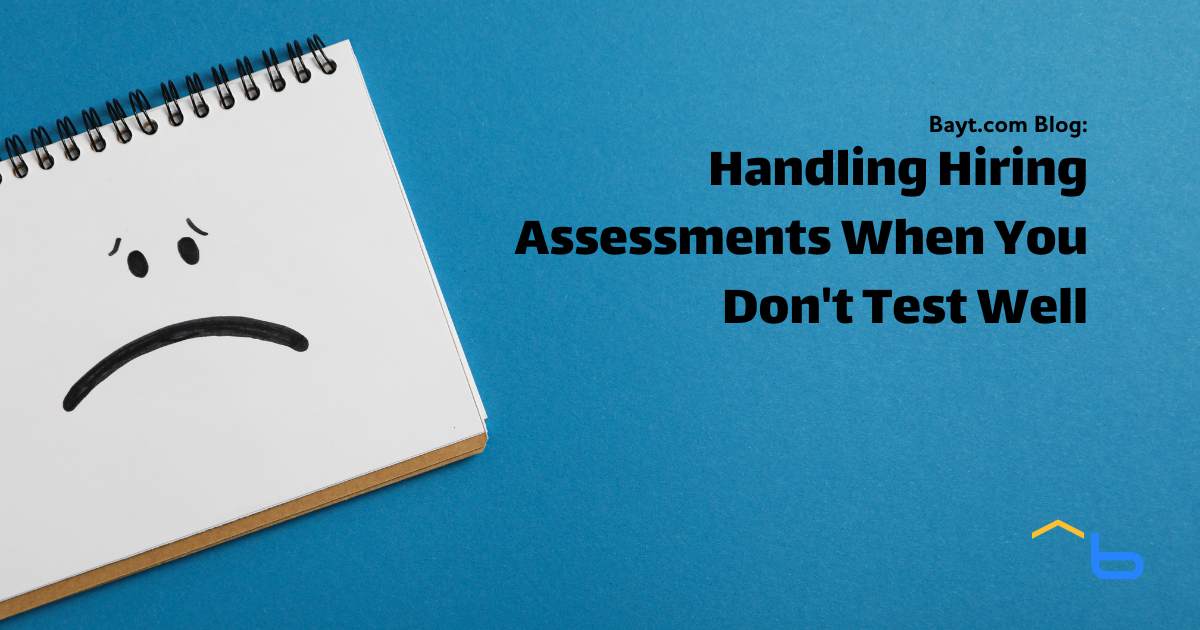
For many job seekers, hiring assessments are one of the most nerve-wracking parts of the job search process. While some people easily breeze through these assessments, others find them incredibly challenging, particularly if they don’t test well. Someone once told me that they were so nervous during a test, that they forgot how to save the file on desktop! These assessments can take many forms, including aptitude tests, personality assessments, skills evaluations, and situational judgment tests. In this blog, we’ll highlight how performance anxiety can impact your results, and provide valuable tips on handling hiring assessments effectively.
Understanding performance anxiety
Performance anxiety, also known as test anxiety, is a type of anxiety that can affect anyone, but it often hits hardest when someone is faced with a high-stakes situation like a hiring assessment. Symptoms can include sweating, rapid heartbeat, nausea, and difficulty concentrating. This anxiety can stem from a fear of failure, lack of preparation, or negative past experiences with testing.
Why some people don’t do well on tests
- Anxiety: High levels of anxiety can hinder your ability to concentrate and recall information, leading to poor performance.
- Lack of preparation: If you’re not familiar with the test format or content, it’s natural to feel unprepared and overwhelmed.
- Negative past experiences: Previous failures or negative experiences with testing can create a mental block, making it difficult to perform well.
- Overthinking: Overanalyzing questions and second-guessing your answers can eat up valuable time and lead to mistakes.
Tips for handling hiring assessments
- Prepare thoroughly
Preparation is key to overcoming test anxiety and performing well on assessments. Here’s how to get started:
- Research the test: Find out what type of assessment you’ll be taking. Will it be an aptitude test, personality assessment, or skills evaluation? Knowing what to expect can help you prepare more effectively.
- Practice tests: Take practice tests to familiarize yourself with the format and types of questions you’ll encounter. Many online resources offer free practice tests for various types of assessments.
- Study relevant material: Review any relevant material or brush up on skills that may be tested. For example, if you’re taking a math aptitude test, practice basic math skills and problem-solving techniques.
- Develop test-taking strategies
Having a strategy in place can help you manage your time and approach questions more effectively:
- Read instructions carefully: Take the time to read all instructions thoroughly before starting the test. Misunderstanding directions can lead to avoidable mistakes.
- Manage your time: Allocate your time wisely. Don’t spend too long on any one question. If you’re stuck, move on and return to it later if time allows.
- Answer easy questions first: Boost your confidence by answering the questions you find easiest first. This can help you build momentum and reduce anxiety.
- Eliminate wrong answers: Use the process of elimination to narrow down your choices on multiple-choice questions. This can increase your chances of selecting the correct answer.
- Practice relaxation techniques
Learning how to calm your mind and body can significantly improve your test performance:
- Deep breathing: Practice deep breathing exercises to help reduce anxiety. Take slow, deep breaths in through your nose and out through your mouth.
- Visualization: Visualize yourself succeeding on the test. Positive imagery can boost your confidence and reduce anxiety.
- Stay positive: Maintain a positive mindset. Remind yourself that you’ve prepared and are capable of doing well.
- Take care of your body
Physical well-being plays a crucial role in mental performance:
- Sleep well: Ensure you get a good night’s sleep before the test. Lack of sleep can impair cognitive function and concentration.
- Eat a balanced meal: Eat a nutritious meal before the test to keep your energy levels up. Avoid excessive caffeine, which can increase anxiety.
- Exercise: Engage in light exercise to reduce stress and improve your mood.
- Seek support
Don’t be afraid to seek support from friends, family, or professionals:
- Talk about your anxiety: Discuss your fears and concerns with someone you trust. Sometimes, just talking about your anxiety can help alleviate it.
- Professional help: If your test anxiety is severe, consider seeking help from a mental health professional. Cognitive-behavioral therapy (CBT) and other treatments can be very effective.
- Reflect and learn
After the assessment, take the time to reflect on your performance and learn from the experience:
- Identify areas for improvement: Think about what went well and what didn’t. Identify areas where you can improve for future tests.
- Practice more: If you didn’t perform as well as you’d hoped, don’t get discouraged. Use it as a learning experience and continue to practice and prepare.
Found this helpful? Let us know in the comments below, we’d love to hear about your experiences.
